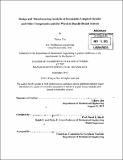Design and manufacturing analysis of resonantly coupled circuits and other components used for wireless benefit-denial system
Author(s)
Zhu, Tianyu, M. Eng. Massachusetts Institute of Technology
DownloadFull printable version (7.929Mb)
Other Contributors
Massachusetts Institute of Technology. Department of Mechanical Engineering.
Advisor
David E. Hardt.
Terms of use
Metadata
Show full item recordAbstract
A new benefit-denial system using RFID technology and inductive heating is under development by ProTeqt Technologies. During the deactivation process, an enabler receives electromagnetic waves and turns the energy to heat, causing the polymeric material inside to expand and create force. An LC circuit in the locking mechanism, acting as a weakly coupled electromagnetic resonator, is used to improve energy transfer efficiency. The design of the LC circuit, as well as the measurement of the resulting force is presented. Due to the manufacturing variability of each component, the force generated by the enabler in the lock is uncertain. In the thesis, an analysis of the manufacturing variability and the distribution of the resulting force was conducted. A simulation model was developed to predict the robustness of the lock system. The test results show that the force generated is significantly more than the force needed, proving that the unlocking process is highly reliable. The result generated by the simulation validates the force test results.
Description
Thesis: M. Eng. in Manufacturing, Massachusetts Institute of Technology, Department of Mechanical Engineering, 2013. Cataloged from PDF version of thesis. Includes bibliographical references (pages 74-75).
Date issued
2013Department
Massachusetts Institute of Technology. Department of Mechanical EngineeringPublisher
Massachusetts Institute of Technology
Keywords
Mechanical Engineering.